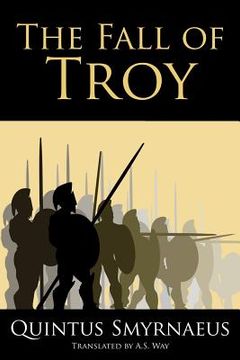Reseña del libro "The Fall of Troy (en Inglés)"
The Fall of Troy Quintus Smyrnaeus, also known as Kointos Smyrnaios, was a Greek epic poet whose Posthomerica, following "after Homer" continues the narration of the Trojan War. The dates of Smyrnaeus's life are controversial, but they are traditionally placed in the latter part of the 4th century AD. "His date is approximately settled by two passages in the poem, viz. vi. 531 sqq., in which occurs an illustration drawn from the man-and-beast fights of the amphitheatre, which were suppressed by Theodosius I. [379-395 A.D.]; and xiii. 335 sqq., which contains a prophecy, the special particularity of which, it is maintained by Tychsen and Koechly, limits its applicability to the middle of the fourth century A.D." Some scholars suggest an earlier date in the 3rd or even the 2nd century, arguing that his Posthomerica shows an influence from the "Second Sophistic", the school of Greek orators who flourished in the 1st and 2nd centuries. According to his own account [xii. 310], he began composing poetry in his early youth while tending sheep near Smyrna [present-day Izmir]. His epic in fourteen books, known as the Posthomerica, covers the period between the end of Homer's Iliad and the end of the Trojan War. Its primary importance is as the earliest surviving work to cover this period, the archaic works in the Epic Cycle, which he knew and drew upon, having been lost. His materials are borrowed from the cyclic poems from which Virgil [with whose works he was probably acquainted] also drew, in particular the Aethiopis [Coming of Memnon] and the Iliupersis [Destruction of Troy] of Arctinus of Miletus and the Ilias Mikra [Little Iliad] of Lesches. His work is closely modelled on Homer, though Quintus is universally acknowledged to be inferior to Homer as a poet. The Posthomerica The first four books, covering the same ground as the Aethiopis of Arctinus of Miletus, describe the doughty deeds and deaths of Penthesileia the Amazon, of Memnon, son of Eos, the dawn goddess, slain by Achilles, and of Achilles himself; and the funeral games in his honour. Books five through twelve, covering the same ground as the Little Iliad of Lesches, span the contest between Aias and Odysseus for the arms of Achilles, the death of Aias of suicide after his loss, the exploits of Neoptolemus, Eurypylus and Deiphobus, the deaths of Paris and Oenone, and the building of the wooden horse. The remaining books, covering the same ground as Arctinus' The Sack of Troy, relate the capture of Troy by means of the wooden horse, the sacrifice of Polyxena at the grave of Achilles, the departure of the Greeks, and their dispersal by storm.

